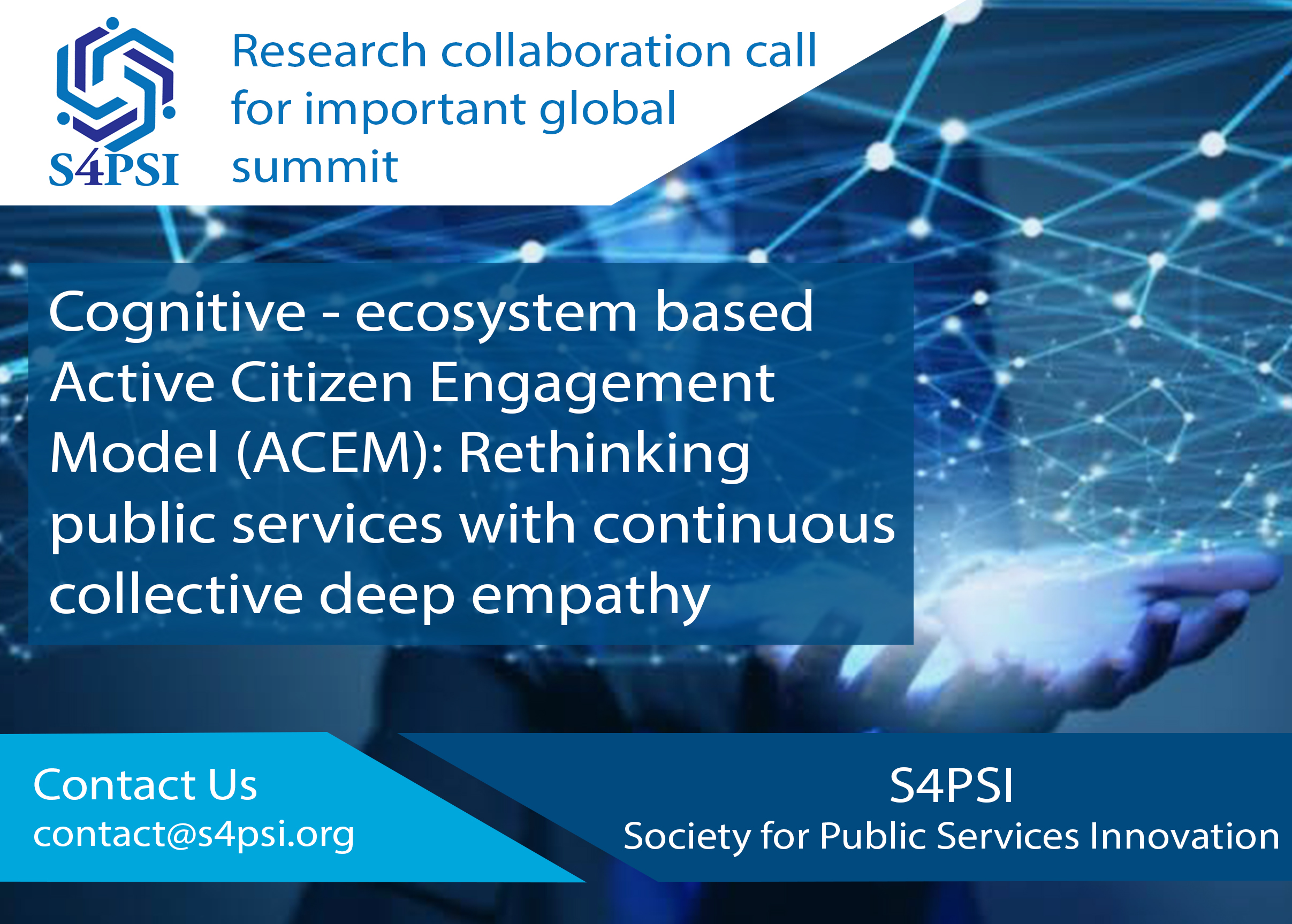
Cognitive-Ecosystem based ACEM: Rethinking Public Services with Continuous Collective Deep Empathy
The research project on “Cognitive-ecosystem Based Active Citizen Engagement Model (ACEM): Rethinking Public Services with Continuous Collective Deep Empathy” is a groundbreaking initiative aimed at transforming public service delivery through the integration of cognitive technologies, ecosystem-based approaches, and active citizen engagement strategies. The ACEM research project seeks to reimagine the relationship between governments and citizens by fostering continuous collaboration, empathy, and co-creation in the design, delivery, and evaluation of public services.
Background and Rationale
- Traditional models of public service delivery often suffer from inefficiencies, lack of responsiveness, and limited citizen participation. There is a growing recognition of the need to shift towards more citizen-centric approaches that empower individuals and communities to actively engage in shaping the services they receive.

- The ACEM research project builds on emerging trends in cognitive computing, ecosystem thinking, and participatory governance to develop an innovative model of public service delivery that prioritizes citizen voice, agency, and collaboration.
Objectives
- Develop a Cognitive-Ecosystem Based Active Citizen Engagement Model (ACEM)
The ACEM research project aims to develop a conceptual framework and practical toolkit for implementing an ACEM that integrates cognitive technologies, ecosystem principles, and citizen engagement strategies to co-create and deliver public services.
- Promote continuous collective deep empathy
The ACEM emphasizes the importance of empathy in public service delivery, fostering mutual understanding, trust, and cooperation between government institutions and citizens. By promoting continuous dialogue and empathy-building activities, the ACEM seeks to enhance the quality, relevance, and inclusiveness of public services.
- Foster a culture of co-creation and innovation
The ACEM encourages governments, citizens, and other stakeholders to collaborate in the design, implementation, and evaluation of public services, leveraging collective intelligence, creativity, and diverse perspectives to address complex societal challenges.
Key Components of the ACEM
- Cognitive Technologies
The ACEM leverages cognitive technologies, such as artificial intelligence (AI), machine learning (ML), natural language processing (NLP), and sentiment analysis, to analyze citizen feedback, identify emerging needs and preferences, and personalize service delivery.
- Ecosystem Thinking
The ACEM adopts an ecosystem-based approach to public service delivery, recognizing the interconnectedness of actors, institutions, and systems involved. It seeks to build partnerships, networks, and collaborative platforms that enable governments, citizens, civil society organizations, and businesses to co-create and deliver services more effectively.
- Active Citizen Engagement Strategies
The ACEM employs a variety of citizen engagement strategies, including participatory budgeting, crowdsourcing, co-design workshops, citizen juries, and online forums, to involve citizens in decision-making processes, policy formulation, and service delivery.
- Continuous Empathy-Building Activities
The ACEM promotes continuous empathy-building activities, such as empathy workshops, storytelling sessions, community dialogues, and cultural exchanges, to foster mutual understanding, empathy, and solidarity among government officials and citizens.
Research Methodology
- The ACEM research project adopts a participatory action research approach, engaging government agencies, citizens, researchers, and other stakeholders in the co-design and implementation of the ACEM.
- The research methodology involves a combination of qualitative and quantitative methods, including stakeholder interviews, focus groups, surveys, ethnographic studies, and case studies.
- Data collection includes gathering citizen feedback, monitoring social media conversations, analyzing administrative records, and conducting sentiment analysis to understand citizen preferences, perceptions, and experiences with public services.
- The research process is iterative, with ongoing feedback loops between data collection, analysis, and intervention design to inform decision-making and adapt strategies based on real-time insights and learning.
Expected Outcomes and Impact
- The ACEM research project is expected to produce a conceptual framework, practical guidelines, and a toolkit for implementing ACEM in diverse contexts and settings.
- The research findings and recommendations generated by the ACEM have the potential to inform policy and practice in public service delivery, citizen engagement, and governance reform at the local, national, and international levels.
- By promoting continuous collective deep empathy, the ACEM contributes to building trust, social cohesion, and democratic governance, leading to more responsive, accountable, and inclusive public institutions.
- Ultimately, the ACEM research project aims to empower citizens, strengthen their voice and agency, and co-create a more equitable, resilient, and sustainable society through collaborative public service delivery.
In summary, the research project on Cognitive-Ecosystem Based Active Citizen Engagement Model (ACEM): Rethinking Public Services with Continuous Collective Deep Empathy represents a pioneering effort to reimagine public service delivery in the digital age. Through its innovative approach, emphasis on empathy and collaboration, and commitment to citizen empowerment, the ACEM has the potential to revolutionize the way governments and citizens interact and work together to address complex societal challenges and improve the well-being of communities.
